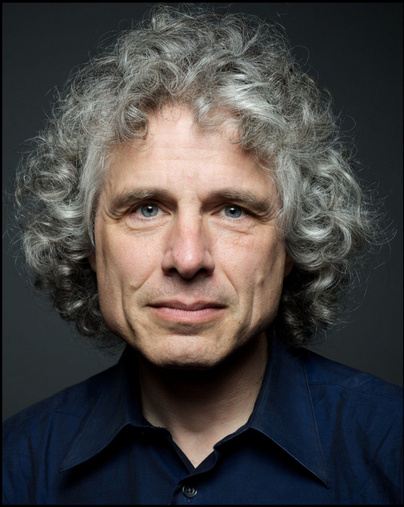Steven Pinker Quotes
The mind is a neural computer
We are probably living in the most peaceful time in our species’ existence.
Those who cannot remember the past are condemned to compute it.
No, it's not all in the genes, but what isn't in the genes isn't in the family environment either.
Status and dominance can fade but a friend will be there through thick and thin.
Evolutionary psychology is one of four sciences that are bringing human nature back into the picture.
As many political writers have pointed out, commitment to political equality is not an empirical claim that people are clones.
The decline of violence is a fractal phenomenon. You can see it over millennia, over centuries, over decades and over years.
By exploring the political and moral colorings of discoveries about what makes us tick, we can have a more honest science and a less fearful intellectual milieu.
The newest research is showing that many properties of the brain are genetically organized, and don't depend on information coming in from the senses.
Hard times show you who your real friends are. That is because the point of friendship, in evolutionary terms, is to save you in hard times when it`s not worth anyone else`s trouble.
Life is a pinball game in which we bounce and graze through a gantlet of chutes and bumpers. Perhaps our history of collisions and near misses explains what made us what we are.
The crux of the argument is that complex language is universal, because children actually invent it, generation after generation -not because they are taught, not because they are generally smart, not because it is useful to them, just because they can't help it.
In culture after culture, people believe that the soul lives on after death, that rituals can change the physical world and divine the truth, and that illness and misfortune are caused and alleviated by spirits, ghosts, saints ... and gods.
Art works because it appeals to certain faculties of the mind. Music depends on details of the auditory system, painting and sculpture on the visual system. Poetry and literature depend on language.
It's natural to think that living things must be the handiwork of a designer. But it was also natural to think that the sun went around the earth. Overcoming naive impressions to figure out how things really work is one of humanity's highest callings.
Parents provide their children with genes as well as an environment, so the fact that talkative parents have kids with good language skills could simply mean that and that the same genes that make parents talkative make children articulate.
Just as blueprints don't necessarily specify blue buildings, selfish genes don't necessarily specify selfish organisms. As we shall see, sometimes the most selfish thing a gene can do is build a selfless brain. Genes are a play within a play, not the interior monologue of the players.
Chess masters are known for their remarkable memory for the pieces on a chessboard. But it's not because people with photographic memories become chess masters. The masters are no better than beginners when remembering a board of randomly arranged pieces. Their memory captures meaningful relations among the pieces, such as threats and defenses, not just their distribution in space.
Nature is a hanging judge," goes an old saying. Many tragedies come from our physical and cognitive makeup. Our bodies are extraordinarily improbable arrangements of matter, with many ways for things to go wrong and only a few ways for things to go right. We are certain to die, and smart enough to know it. Our minds are adapted to a world that no longer exists, prone to misunderstandings correctable only by arduous education, and condemned to perplexity about the deepest questions we can ascertain.
Stripped to its essentials, every decision in life amounts to choosing which lottery ticket to buy. . . . Most organisms don't buy lottery tickets, but they all choose between gambles every time their bodies can move in more than one way. They should be willing to 'pay' for information---in tissue, energy, and time---if the cost is lower than the expected payoff in food, safety, mating opportunities, and other resources, all ultimately valuated in the expected number of surviving offspring. In multicellular animals the information is gathered and translated into profitable decisions by the nervous system.
The main lesson of thirty-five years of AI research is that the hard problems are easy and the easy problems are hard. The mental abilities of a four-year-old that we take for granted – recognizing a face, lifting a pencil, walking across a room, answering a question – in fact solve some of the hardest engineering problems ever conceived.... As the new generation of intelligent devices appears, it will be the stock analysts and petrochemical engineers and parole board members who are in danger of being replaced by machines. The gardeners, receptionists, and cooks are secure in their jobs for decades to come.

